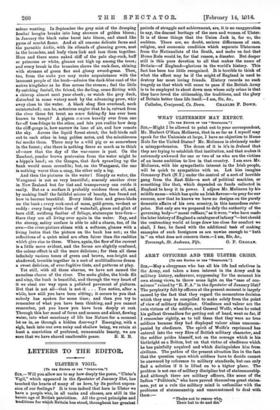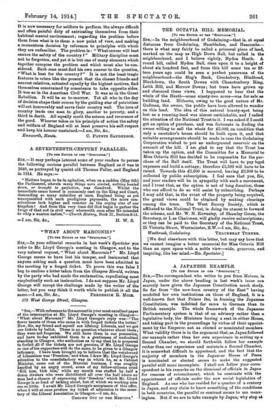ARMY OFFICERS AND THE ULSTER CRISIS. [To mss Lonna or
Tao •Srsesron"]
Snt,—May a clergyman who has all his life had relatives in the Army, and taken a keen interest in the Army and in military history, endeavour, suppressing -for the moment his own strong views, to throw some light on the "case of con. etience" raised by "R. F. A." in the Spectator of January 31st? The perplexity felt by officers at the present moment is largely caused by the fact that they regard the momentous decision which they may be compelled to make solely from the point of view of military discipline. Obedience and valour arc the twin virtues of the soldier, and General Wolfe, when he rated his gallant Grenadiers for getting out of hand, went so far, if I remember rightly, as to tell them that they were no true soldiers because they had displayed valour alone unaccom- panied by obedience. The spirit of Wolfe's reprimand has entered into the very fibre of British military character, and the soldier prides himself, not on the courage which is his birthright as a Briton, but on that virtue of obedience which he has painfully acquired and which distinguishes him from civilians. The pathos of the present situation lies in the fact that the question upon which soldiers have to decide cannot be answered by reference to military standards, but can only find a solution if it is lifted on to a higher plane. The problem is not one of military discipline but of statesmanship. And although there are military officers, like some of the Indian "Political.," who have proved themselves great states- men, yet as a rule the military mind is unfamiliar with the problems of statesmanship and unaccustomed to deal with
them:— ^ Theirs not to reason why, Their but to do and die."
It is now necessary for soldiers to perform the always dfficult and often painful duty of extricating themselves from their habitual mental environment; regarding the problem before them from what is to them a new point of view, and making a momentous decision by reference to principles with which they are unfamiliar. The problem is "What course will beat ensure the safety of the country?" Military discipline must not be forgotten, and yet it is but one of many elements which together compose the problem and which must also be con- sidered. Each man must find his own answer to the question, "What is beat for the country?" It is not the least tragic features in crises like the present that the closest friends and nearest relatives, actuated equally by the highest motives, find themselves constrained by conscience to take opposite aides. It was so in the American Civil War. It was so in the Great Rebellion. It will be so to-morrow. Yet all who in the day of decision shape their course by the guiding star of patriotism will act honourably and serve their country well. The love of country leads one man to glory, another to poverty, and a third to death. All equally merit the esteem and reverence of the good. Whoever takes as his principle of action the safety and welfare of England will at least preserve his self-respect and keep his honour unstained.—I am, Sir, &c.,







































 Previous page
Previous page